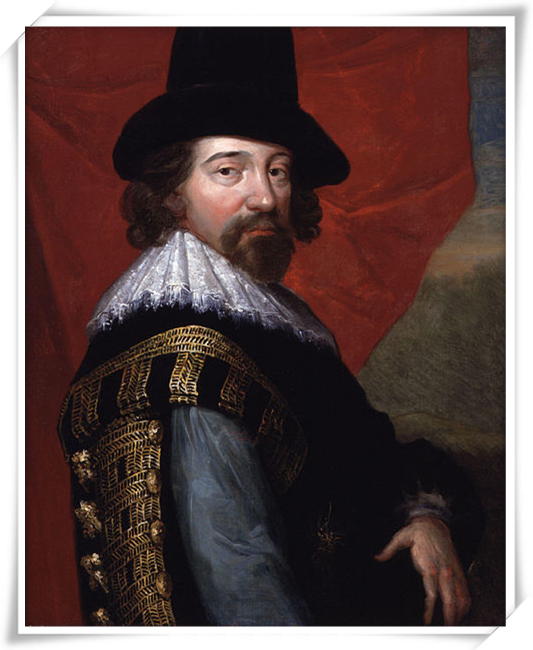 Francis Bacon弗兰西斯·培根
Francis Bacon弗兰西斯·培根
1561—1626
English philosopher, statesman, scientist, lawyer, jurist,author and pioneer of the scientific method.
弗兰西斯·培根,英国哲学家、随笔作家、朝臣、法理学家和政治家。其作品《新工具论》提出了以观察和实验为基础的科学认识理论,作为归纳法理论逐渐为人所知,是科学方法的最著名鼓吹者。
Bacon 1. 职业名称,制作或销售咸肉者,来源于中世纪英语及古法语,含义是“咸肉,火腿”; 2. [英格兰人姓氏] 培根。来源于日耳曼语人名,含义是“战斗”。
Although his political career ended in disgrace, he remained extremely influential through his works,especially as philosophical advocate and practitioner of the scientific method during the scientific revolution.Bacon has been called the father of empiricism. His works established and popularised inductive methodologies for scientific inquiry, often called the Baconian method,or simply the scientific method.His demand for a planned procedure of investigating all things natural marked a new turn in the rhetorical and theoretical framework for science, much of which still surrounds conceptions of proper methodology today.His dedication,while studying the effects of freezing on the preservation of meat,probably led to his death, bringing him into a rare historical group of scientists who were killed by their own experiments.
培根是第一个意识到科学及其方法论的历史意义以及它在人类生活中可能扮演的角色的人。他试图通过分析和确定科学的一般方法和表明其应用方式,给予新科学运动以发展的动力和方向。1620年,他主要的著作《学术的伟大复兴》出版了一部分,到死时只写到了第二部分《新工具论》,主要是对科学方法的分析,是书中最完整的部分,对十七世纪英国和十八世纪法国影响都极大。在这部著作里他提出了以观察和实验为基础的科学认识理论,作为归纳法理论逐渐为人所知。培根认为对自然的科学理解和技术控制是相辅相成,两者都是运用科学方法的成果。培根对印刷、火药和罗盘的发明非常重视。他以这三种发明为例,证明近代人比古希腊人高明得多。培根说:“因此促进科学和技术发展的新科学方法,首先要求的就是去寻找新的原理、新的操作程序和新的事实。这类原理和事实可在技术知识中找到,也可在实验科学中找到当我们理解了这些原理和知识以后,它们就会导致技术上和科学上的新应用。”
An interesting characteristic of Bacon's apparently scientific tract was that, although he amassed an overwhelming body of empirical data, he did not make any original discoveries.Indeed, that was never his intention, and such an evaluation of Bacon's legacy may wrong fully lead to an unjust comparison with Newton.Bacon never claimed to have brilliantly revealed new unshakable truths about nature—in fact, he believed that such an endeavor is not the work of single minds but that of whole generations by gradual degrees toward reliable knowledge.In many ways, Bacon's contribution to the advancement of human knowledge lies not in the fruit of his scientific research but in the reinterpretation of the methods of natural philosophy.


